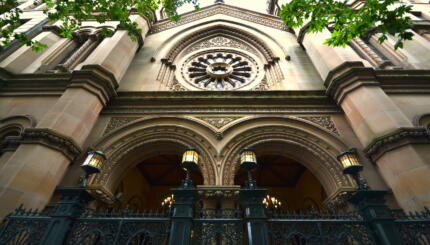This Friday, I will be giving a lecture about my dissertation, Choice Among the Chosen: The School Choice Movement and the American Jewish Community, at Millsaps College.
I haven’t really looked at my dissertation since defending it this past June, but it has been fun to revisit the story – and good motivation to start moving it toward publication. It’s a story worth sharing; here’s just a taste.
Rabbi Sherer with Gov. Mario Cuomo. Image source: LLI
I was driven to write about the topic after attending a rally for school choice initiatives at Beren Academy in Houston, Texas. Houston boasts an ever-growing Orthodox Jewish population. I attended the rally with my father, who was a Republican at the time—and remains a Southern Baptist to this day. He had never met an Orthodox Jew, but quickly felt right at home when “Rabbi T.” began speaking.
With a strong Brooklyn accent, the rabbi fired up the crowd by asking: “Who’s a proud American? Who’s a proud Texan?!”
The crowd cheered, and Rabbi T. continued: “We proud Americans like having choice…this is what democracy is all about. We choose our profession, how we lead our lives, what brand to buy at the supermarket, so why shouldn’t we as Jews be able to choose our education and not decide between food or day school tuition?”
My father was nodding in agreement. He asked, “Are these people Jewish? They sound like Republicans to me.”
I looked at him in amazement. “Dad, there are plenty of Jewish Republicans.”
It wasn’t a new thing for me to hear observant Jews espousing rhetoric that reflected Republican values. What was more surprising was the fact they were staunchly arguing for government funding for parochial schools. Historically, the American Jewish community has ardently supported church-state separation. When did that change, and why?
Turns out that some Jews have been advocating government funds for parochial/religious schools for decades – since the early 1960s. The leading advocates for government funds for Jewish schools were Agudath Israel, Umesorah, and the Orthodox Union. For Orthodox lobbying groups, who did not want to send their children to mixed-gender schools, their constitutional right to education trumped Establishment clause concerns. They claimed to need government support because the Jewish community wasn’t funding their institutions.
At the time, Jewish Federations did not want to support Orthodox schools teaching values not held by Jews in the mainstream community. In fact, at one debate, a female American Jewish Congress member threw a subway token at Rabbi Moshe Sherer, president of Agudath Israel, snarkily remarking, “…you must need this for your ride home. That’s all the aid you will get from the liberal Jewish community. It isn’t my responsibility to support your religious choices.”
Leo Pfeffer, the leading Jewish lawyer who fought against school prayer, fought tooth and nail against the work of those like Sherer. The harder Pfeffer fought against federal and state funds going into these schools, the more motivated the Orthodox community became. The battle grew ugly. Pfeffer and his allies were able to convince the Courts throughout the late 1960s and 1970s to declare all but paltry aid to nonpublic schools unconstitutional. In response, Orthodox Jews and Catholics tried new approaches – namely tax credits and vouchers, which come with very little government oversight.
When evangelical Protestants joined the mix, powerful changes in educational policy occurred, ones that increased economic inequality and decreased racial diversity in the American educational system. The voucher and tax credit approach was eventually deemed constitutional. Orthodox Jews, Catholics, and evangelicals collectively wrought this change, all believing it led to more moral schooling for their children. (Evangelicals were once against government funding for private schools as well, especially since up until the 1960s public schools reflected distinctly Protestant values. Public schools were essentially tools for disseminating their values, but that changed after the Supreme Court outlawed prayer and bible reading at school.)
A lot of people think the Moral Majority grew as a result of Roe v. Wade. But the Moral Majority was formed as a result of the Carter administration trying to withdraw tax exemptions from Christian schools, formed in the wake of des-segregation and secularization of public education. Tax exemptions saved these private schools a tremendous amount of money. If those had been revoked, these many of these schools would have dissolved.
Religious private schools clearly still exist, receive tax exempt status, vouchers, tax credits, and so on – a victory for Sherer and his allies. The amount they receive is no longer paltry, either. Last year, $1,233,200,000 was spent on tuition for approximately 337,000 students attending private schools, and that money essentially comes with no government oversight, allowing schools to teach whatever they want and admit whomever they want. Depending on the state, some of that goes to the nearly 255,000 students enrolled in 861 Jewish day schools. In states like New York, yeshivot receive millions each year for things like mandatory services. In all of these cases, that is money not going to public schools. With charter schools also booming, public schools are ultimately getting fewer resources which in turn, hurts public school students.
This reality is very pronounced here in Mississippi, and certainly in Jackson. Statistics show that a large percentage of Jackson Public School students drop out in ninth grade, and the turnover rate for teachers and administrators is abysmal. Jackson residents who have the means to leave the public school system have plenty of nice private school options from which to choose.
So, what do you think? When it comes to Jewish values, is it more important for Jews to fight against school choice initiatives, advocating for better public education for all? Or should they push for more school choice/voucher and tax credit initiatives, promoting private school options while giving lower and middle income Jewish families more funding to access to an increasingly expensive Jewish day school education?
The Jewish world is full of debates.
Join the conversation through MyJewishLearning’s weekly blogs newsletter
.



